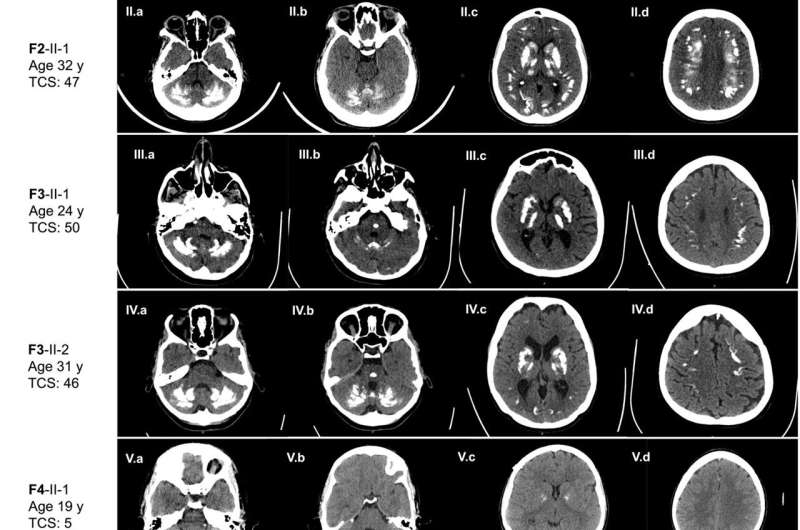This article has been reviewed according to Science X's editorial process and policies. Editors have highlighted the following attributes while ensuring the content's credibility:
fact-checked
trusted source
proofread
Shedding new light on brain calcification

Brain calcification can cause movement disorders and cognitive impairment. Researchers at the Arnesen Lab at UiB have now identified a gene that provides new insight into how these calcifications occur.
"Calcifications are often associated with disease states in joints or blood vessels, but it is actually also very common in the brain. Brain calcification is, however, less well studied," says researcher Henriette Aksnes at the Department of Biomedicine, University of Bergen, Norway.
She and several others in the Arnesen lab have taken a closer look at a specific type of brain calcification called primary familial brain calcification (PFBC, formerly called Fahr's disease). In this rare neurodegenerative condition, progressive muscular symptoms, psychiatric symptoms, and cognitive impairment occur, "This condition is caused by pathogenic, meaning disease-causing, gene variants and entail particularly severe brain calcification," says Aksnes.
New gene linked to brain calcification
PFBC can be caused by mutations in various genes, and researchers are working to find out which ones. Now, through an international collaboration, the research group at UiB has discovered a new gene that can be linked to this disease.
The Arnesen Lab has expertise in the novel PFBC gene, NAA60, such as through the doctoral and postdoctoral work of Henriette Aksnes.
"PFBC is a very favorable model for studying brain calcifications," she explains.
Among those with a PFBC diagnosis, errors are found in various genes. There were six genes linked to the disease before the research group's work.
"Since defects in different genes cause the same disease, this indicates which molecular players are involved in the calcification process," Aksnes explains.
"By adding NAA60 to the list as the seventh gene that can cause PFBC, and linking this with our previous work, we have made a big step towards being able to explain how calcification can develop in the brain," she continues.
Large international collaboration
This important finding was shared with the scientific community as early as summer 2022 at the EMBO conference organized by the research community in Bergen.
Since then, the international team has identified additional families with different types of NAA60 variants that are associated with loss of function. The first NAA60-PFBC family was identified at University College London (UCL) by neurologists Viorica Chelban and Henry Houlden.
"During the last few years, a large international collaboration took form to describe together a total of six different NAA60 mutations, found in ten individuals from seven families, now presented in this article," says Aksnes.
Since half of those currently diagnosed with PFBC do not have a genetic explanation, it is assumed that NAA60 may be behind additional cases. The work has now been published in Nature Communications.
NAA60 neuropathology—a door opener for a new research team
"The recently published article presents the new gene link and shows that the mutations cause loss of NAA60 function," says Aksnes.
The loss of function manifests itself in a lack of the NAA60 protein that is normally expressed through the gene.
"But there is still a lot of work to be done to understand the molecular processes that can explain how a lack of the NAA60 protein leads to brain disease," says the researcher.
"The work we will now undertake will be very important to understand better brain calcifications and how they are connected to dementia," she says.
More information: Viorica Chelban et al, Biallelic NAA60 variants with impaired n-terminal acetylation capacity cause autosomal recessive primary familial brain calcifications, Nature Communications (2024). DOI: 10.1038/s41467-024-46354-0



















